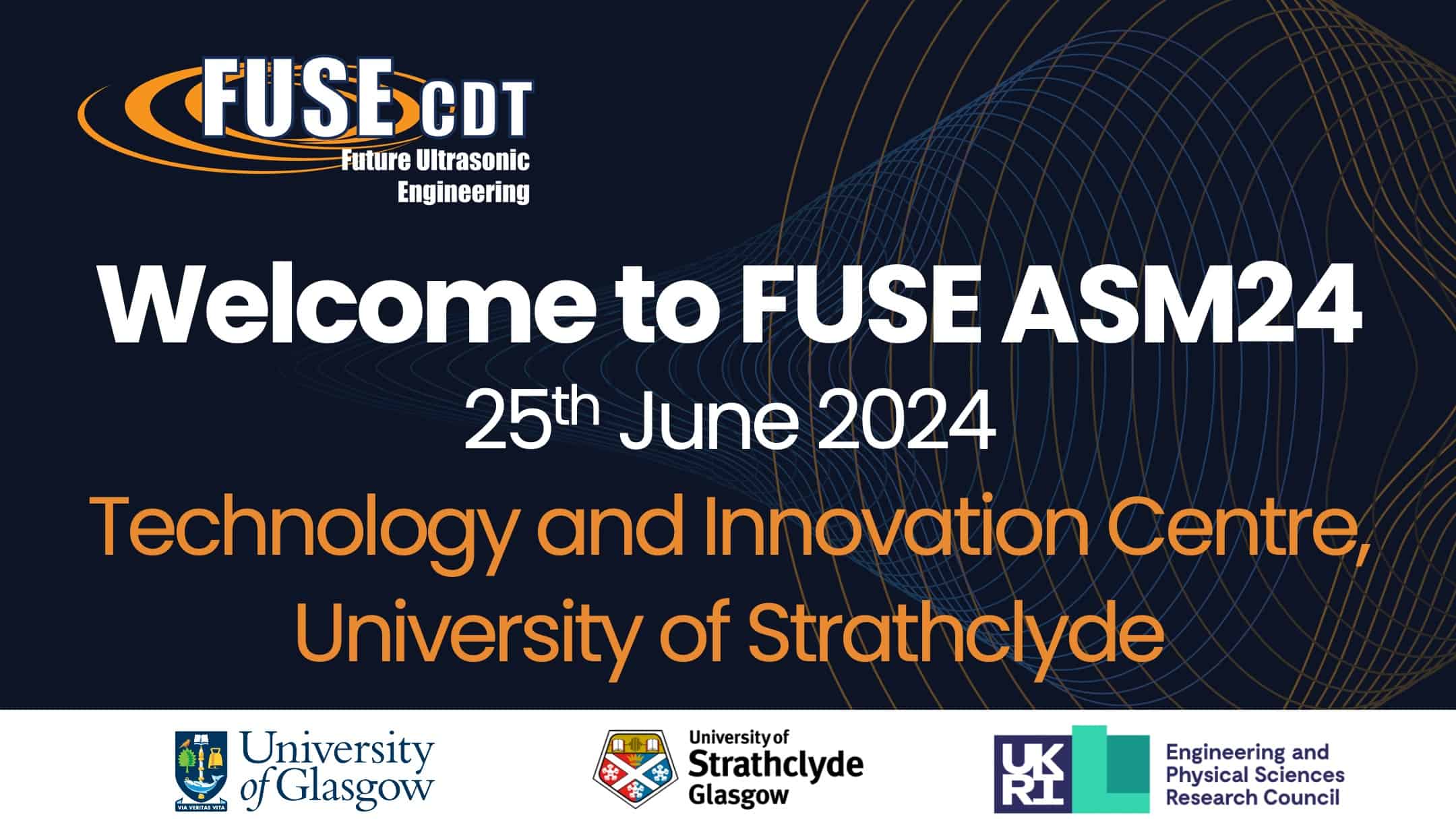
Our Annual Scientific Meeting brings together our FUSE community of students, academics and partners to share PhD/EngD research projects, academic areas of expertise and latest research and hearing our External Partners sharing their experiences in Ultrasound technology development, along with the opportunity to network meeting old friends and colleagues and making new connections.
Thank you to Verasonics for sponsoring our FUSE ASM 2024 best Student Presentations/Posters

AGENDA
| Time | Duration (mins) | Session | Presenters |
|---|---|---|---|
| 09:00-09:20 | 20 | Registration / Networking | |
| 09:20–09:25 | 5 | Welcome from Chairs | |
| 09:25-09:30 | 5 | CDT Directors Update | Prof. James Windmill |
| 09:30-10:10 | 40 | C2 Student Presentations (3/6) | FUSE Cohort 2 |
| 10:10-10:25 | 15 | BREAK | |
| 10:25-11:10 | 45 | Academic Presentations | Dr. Paul Prentice, UofG |
| Dr. Gaetano Di Caterina, UoS | |||
| Dr. Katherine Tant, UofG | |||
| 11:10-12:00 | 50 | Industry Session | FUSE industry partners & formal rotating groups of students for talks and discussions |
| 12:00-12:45 | 45 | Keynote Speaker - Academic | Prof. Susan Trolier-McKinstry, Pennsylvania State University |
| 12:45–13:45 | 60 | LUNCH & NETWORKING | |
| 13:45-14:35 | 50 | C3 Poster Presentations | FUSE Cohort 3 |
| 14:35-15:20 | 45 | C2 Student Presentations (Continued 3/6) | FUSE Cohort 2 |
| 15:20-15:35 | 15 | BREAK | |
| 15:35-16:20 | 45 | Keynote Speaker - Industry | Dr. Rachael McPhillips, Carbometrics Head of Device Development |
| 16:20-17:10 | 50 | C4 Poster Presentations | FUSE Cohort 4 |
| 17:10-17:40 | 30 | Life after PhD Panel | FUSE C1 and other recent graduates |
| 17:40-17:45 | 5 | Closing Remarks | Chairs |
| 18:00-21:00 | FUSE Dinner at Citation | ||
ABOUT OUR SPEAKERS
PROF. SUSAN TROLIER-MCKINSTRY / KEYNOTE
Susan Trolier-McKinstry is a Pennsylvania State University, Evan Pugh University Professor and Steward S. Flaschen Professor of Ceramic Science and Engineering, and Professor of Electrical Engineering. Her main research interests include thin films for dielectric and piezoelectric applications. She directs both the Center for Dielectrics and Piezoelectrics and the Center for Three-Dimensional Ferroelectric Microelectronics.
She is a member of the National Academy of Engineering, a fellow of the American Ceramic Society, IEEE, and the Materials Research Society, and an academician of the World Academy of Ceramics. She currently serves as an associate editor for Applied Physics Letters. She was 2017 President of the Materials Research Society; previously she served as president of the IEEE Ultrasonics, Ferroelectrics and Frequency Control Society, as well as Keramos.
DR. RACHAEL MCPHILLIPS / KEYNOTE
Dr Rachael McPhillips is the Head of Device Development at Carbometrics. Her background is in medical engineering and manufacturing and has worked for several SMEs driving prototype development and developing product manufacturing lines. Rachael completed her undergraduate degree in Physics with Medical Physics and Bioengineering in Dublin Institute of Technology and completed her PhD in Medicine at the University of Dundee, developing miniature ultrasound transducers for integration into biopsy needles for medical imaging and diagnosis under the supervision of Dr Christine Demore and Dr Sarah Vinnecombe.
She continued to work on the manufacture of miniature of ultrasound transducer packages for various medical applications during her post doc in the University of Glasgow for Prof Sandy Cochran.
Keynote Topic: Ultrasound Transducers – from prototype to production
Paul is Senior Lecturer of ultrasonics at the School of Engineering, University of Glasgow, Deputy Director for the Centre of Medical and Industrial Ultrasonics (C-MIU), and Team-Leader of the Cavitation Laboratory (CavLab). He has researched ultrasonically driven bubble activity for a variety of applications, for over 20 years, including cavitation-mediated therapy (Nature Physics 1(2), 107-110, 2005), graphene exfoliation (Materials Today 49, 10-22, 2021) and precious metal recycling from electronic waste (Ultrasonics Sonochemistry 101, 106701, 2023).
Paul is Fellow of the Institute of Physics (IoP), serves on the IoP Physical Acoustics Group and co-leads a working group developing a Technical Standard on therapeutic cavitation, for the International Electrotechnical Commission (IEC).
Topic: Bubbles on the brain – how does microbubble-cavitation open the blood-brain barrier?
Dr Gaetano Di Caterina is currently Senior Lecturer, and the Leonardo Lecturer, in the Electronic and Electrical Engineering Department at the University of Strathclyde, where he is Director of the Neuromorphic Sensor Signal Processing (NSSP) Lab, within the Centre for Signal and Image Processing (CeSIP) group. Dr Di Caterina has a background in signal, image and video processing, he is Course Director of the MSc in Machine Learning and Deep Learning at Strathclyde, and has published works on Machine Learning, Deep Learning, Neuromorphic technologies and Signal Processing at several international conferences and in academic journals.
Recent research projects include funding from DASA/DSTL, AFOSR/AFRL, ESA and Leonardo UK.
Topic: Neuromorphic sensing and processing for efficient AI
Dr Katherine Tant is an applied mathematician conducting research at the interface between mathematics and industry. In June 2018, she was awarded a 3 year EPSRC UKRI Innovation fellowship for her work in ultrasonic tomography and was subsequently appointed as a Chancellor’s Fellow in the Department of Mathematics and Statistics at the University of Strathclyde in May 2019.
Her research interests revolve around the modelling of waves in complex materials and using this knowledge to ‘see the unseen’.